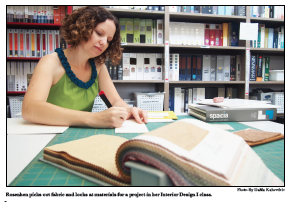Student Angela Rosenhen reflects on her journey
By: DALILA KAHVEDZIC
Editor-in-Chief
 Angela Rosenhen was born in Brazil and lived there until the age of 28 and has now found herself as a part-time Meramec student studying interior design with an emphasis on kitchen and bath.
Angela Rosenhen was born in Brazil and lived there until the age of 28 and has now found herself as a part-time Meramec student studying interior design with an emphasis on kitchen and bath.
Leaving her life behind and living in the United States as well as Canada was something she had never planned, Rosenhen said.
Traveling from Brazil to the United States was an easy adjustment for Rosenhen, but there are many differences between where she grew up and where she now lives.
Something she really misses is as simple as plants, Rosenhen said.
“There are too many plants that don’t grow here and that gives me a sense of origin, when I go to the botanical gardens or something – all those tropical plants. I wish so much I could have those here,” Rosenhen said. “I like to plant things that remind me of home.”
Between Brazil and the United States – cultural differences also vary greatly. In the U.S., there is a sense of safety and community while in Brazil, people are more reserved because of violence, Rosenhen said.
Although there is violence in Brazil, events in Ferguson do not remind Rosenhen of home because in Brazil, there was no division by race. Something that caught Rosenhen’s attention about Ferguson is the immediate blame based off of race.
“He stole because he’s of African American decent, he stole because he is Caucasian. No, he stole because he’s a bad person,” Rosenhen said.
Everybody has mixed blood. Rosenhen is white and not the average Brazilian but her mother‘s skin is very dark. So everything is very mixed, Rosenhen said. She said she never experienced any sense of hatred when she moved to the U.S. with her family.
“I am a foreigner from South America, so your mind goes spinning – what are those people like? And I was so well treated. I never had any kind of prejudice,” Rosenhen said.
Angela and her husband were welcomed with baskets of cookies, wine and pool parties, she said.
“I really say it’s a matter of choice. I am the odd ball in the street and I could never feel different. In any other situation, I have never been treated as a foreigner,” Rosenhen said.
Living a double life
During her time in Brazil, she studied acting for two and a half years and acquired a bachelor’s degree in English; both of which did not have too many differences, Rosenhen said.
“With teaching, you have your stage. When you’re in front and you are talking to people, you get to know people. You know your role; I could be funny and I could do whatever I wanted, and since I taught something that wasn’t mandatory, students would go there because they wanted to learn English. They were grateful and they had cooperation so it was really, really nice,” Rosenhen said.
Rosenhen was an English teacher for eight years. She taught age groups varying from second graders to high executives of international companies, who were very nice to work with.
“They were my favorite because they would become kids again,” Rosenhen said.
“Acting – you are on the stage, literally, but it’s the chance to experiment with different emotions, things that maybe you just inside yourself then you just let it out,” Rosenhen said.
She taught full time as an English teacher, took acting classes and soon after found out she was pregnant. Her husband’s job then called for a move to the United States.
“A few months into pregnancy my husband comes and throws a bomb – how would you like moving to the U.S.?” Rosenhen said.
The job offer, at the time, was supposed to only be for two years, Rosenhen said.
The trials of traveling
They spent their time in St. Louis and in 2010, moved to Toronto, Canada before moving back to St. Louis in 2013.
Canada and Missouri were very different and Rosenhen said she prefers living in St. Louis versus Toronto. She was relieved when her husband’s job called for them to move back to St. Louis.
One thing that stuck out to Rosenhen was the cleanliness of St. Louis as a city. Canada was much less clean, she said.
Moving to and from and getting used to lifestyle changes was not too much trouble, Rosenhen said.
The funniest memory Rosenhen said she has from traveling was going to a doctor to get sleep medication to control her fear of flying.
Between having slept the whole ride to the U.S., being carried off the plane by her husband, and not remembering if she paid the lady she had a scheduled manicure with – Rosenhen realized she needed to get over her fear of flying.
Although she did the right thing and went to the doctor, the medication was just way too strong for her, Rosenhen said.
“Yeah, so I have to control my fear,” Rosenhen said. “Turbulence is the worst part of flying.”
Flying is scary from beginning to end, Rosenhen said.
“But sometimes there are some fun things depending on who you have on the flight. Once I got a flight that was the most unpleasant thing for some people – it was teenagers going to Disney from Brazil – so you can imagine everyone is crazy,” Rosenhen said.
Rosenhen’s daughter was 1 at the time and the girls on the flight took care of her.
“They would play with her and keep her entertained,” Rosenhen said.
This was a relief and Rosenhen said she received nine hours of peaceful rest.
When they arrived to the U.S., Rosenhen and her husband lived in a rented apartment, they sold everything they had and came to the U.S. with only six suitcases full of their belongings.
Soon after having to move many times, Rosenhen and her husband decided that building houses instead of buying or renovating was the choice for them.
“You get to choose everything and you have no surprises,” Rosenhen said.
She said she has no plans to move back to Brazil.
“Corruption is taking over the country, the politically correctedness is exasperating, you can’t open your mouth without somebody threatening to sue you for anything and you can’t have a sense of humor,” Rosenhan said. “It’s just not a place where I grew up.”
The constant moving around to different areas has not taken a toll on the family, especially including her daughter.
“She’s very adaptable – I guess she got this from us,” Rosenhen said. “She’s open to change and this is something good. Here, all of her needs are met.”










